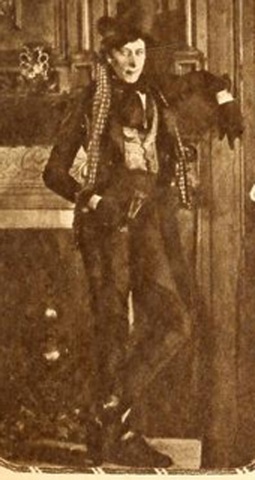“The Adventures of Mr. Pickwick” aka “Pickwick Papers”
(silent, lost)
Ernest Thesiger as Mr. Jingle
1921
Ideal Film Company

“The Adventures of Mr. Pickwick” aka “Pickwick Papers”
(silent, lost)
Ernest Thesiger as Mr. Jingle
1921
Ideal Film Company




from The Picturegoer, December 1921
“Perhaps the best of an excellent cast, however, were Miss Athene Seyler as the spinster Aunt Rachel and Mr. Ernest Thesiger as Alfred Jingle. Of course, they were parts that gave them both great opportunities, but not every one would have made such excellent use of them. Mr. Thesiger thoroughly understood the danger of exaggerating the peculiarities of one of Dickens’ cleverest pen-portraits, and not once did he overdo it.”
The Bookman, February 1922
“Two centuries collided outside the village inn at Shenley, Herts, where coaching scenes were enacted, one morning last week, for the forthcoming Ideal version of ‘The Pickwick Papers.’ Through the group of Pickwickians rehearsing in the road surged motor cars and tradesmen’s vans. To the producer’s horror a 20th century brewer’s dray clattered rudely into this glimpse of 1830 just as he was about to ‘take.’ Then the local schools emptied - a moment dreaded by film artists - and two waiters of Pickwick’s day were deputed to urge the children into the background. Poor Ernest Thesiger, as the lanky Mr. Winkle, was greeted by the infants as Fatty Arbuckle.’ Good-humouredly he dismissed the incident by observing that it proved the Unimportance of Being Ernest.”
Dundee Evening Telegraph, October 11, 1921
“After Mr. Pickwick, the finest character interpretation was Mr. Ernest Thesiger’s presentation of Mr. Jingle. Seedy but debonair, angular and attenuated, yet graceful and sprightly, the cunning man of the world engrossed in the desperate occupation of living by his wits could not have been more skillfully delineated. Mr. Thesiger is without doubt one of the most capable and versatile actors on the London stage. Looking back on his successes in such widely dissimilar roles as Bertram Tully in ‘A Little Bit of Fluff,’ the sober-minded young Scotch student in ‘Mary Rose,’ and the poet-lover of the sombre Italian tragedy, ‘The Love Thief,’ coupled with his versatility as a screen artist, he stands out as a distinguished ornament to his profession.”
Derby Daily Telegraph, January 5, 1922


